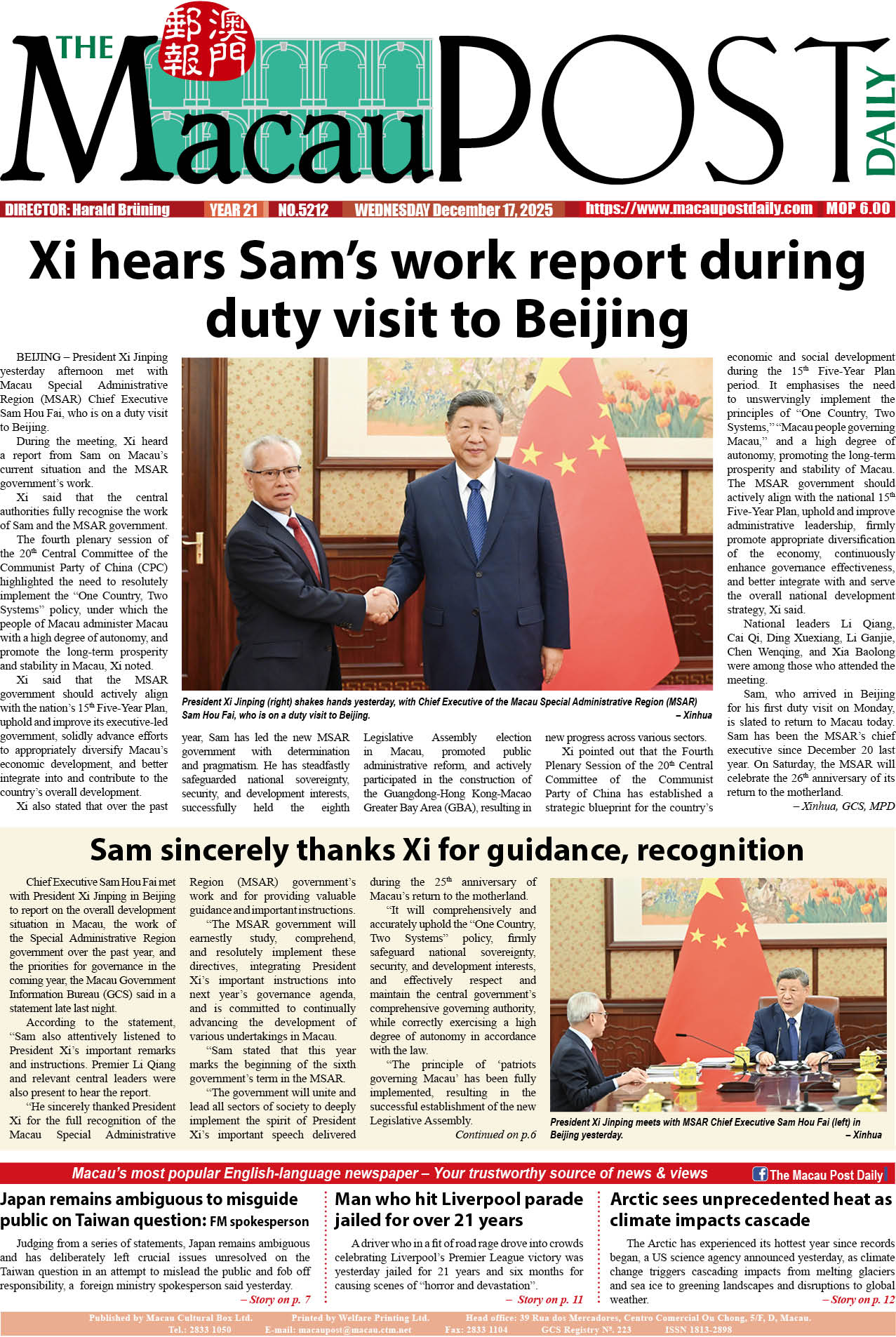Mountain holidays are probably the last thing that comes to mind when the getaway destination is Taiwan, which is widely regarded as a place for short city breaks for Macau and Hong Kong people.
A recent media trip organised by the Taipei Economic and Cultural Office in Macau, Taiwan’s Mainland Affairs Council and Veterans Affairs Council, showcased some of the bucolic alpine scenery and natural treasures that the island boasts, offering urbanites a welcome escape from the concrete jungle of noise and exhaust fumes to tranquillity and healthy doses of fresh air while being surrounded by lush greenery, colours of the seasons, clear blue skies and starry nights.
The three ecotourism attractions included in the trip are among the five recreational high-mountain farms which are run by the Veterans Affairs Council.
Mountain Pepper
The four-day familiarisation tour began with a 2.5-hour bus ride from Taoyuan airport in Taipei to the Cilan Forest Recreation Area in the island’s north-eastern Yilan county, where the Lanyang River, Dowan Creek, and Tiangu’er Creek converge.
The Cilan Forest Recreation Area, together with the Min Chih Forest Recreation Area and Divine Tree Garden, make up the MaKau Ecological Park, located at an altitude of 1,150 to 1,700 metres. The forest has been named as a potential World Heritage Site.
“Ma Kau” is an Atayal aboriginal word for aromatic litsea, also known as “mountain pepper” in Chinese.
Besides there being an abundance of the spice trees, the area is rich in natural ferns and vines and also boasts a jungle trail and plenty of flora and fauna, including a forest of nearly 100 Taiwan Cypress trees that are well over 1,000 years old. One of the 51 huge red cypresses is named after Confucius, as the tree’s reputed age (2,550 years) correlates with the time when the sage lived over 2,000 years ago.
Guided walking tours can be booked at the Cilan Resort, run by the Lealea hotel chain, which offers cosy wooden cabins and European-style cottages as accommodation in the forest, also where a cottage once used by Nationalist leader Chiang Kai-shek is located.
‘Little Switzerland’
From the Cilan Forest Recreation Area, the trip continued to Fushoushan Farm in Lishan Village in Heping, Taichung. The 2.5-hour bus ride offers some spectacular mountain views as it meanders its way up to an altitude of 2,500 metres where the farm is located.
The high-mountain environment makes the farm ideal for growing apples, pears and peaches, and the fruit orchards, flowers and tea plantations at the farm are the achievement of retired soldiers, and the surrounding green cabbage fields are the works of nearby villagers and farmers.
Dubbed “Taiwan’s little Switzerland”, the serene landscape at the farm surrounded by mountains and brilliant sunshine allows even the unskilled take amazing photos with no filters needed.
The highest point of the plateau at 2,614 metres boasts a panoramic view of the Syue Mountain’s western ridge, and there is also Tianchi, or “heavenly pond”, and beside it is the Daguan Pavilion, a lodge where Chiang once stayed at.
There’s also a 150-year-old pine tree named after Chiang at the farm because Chiang and his wife took a photo with the tree once, and on the night of April 5, 1975 when Chiang died, the tree was struck by lightning and as a result the trunk split in half.
Just a few steps from this tree is a so-called Apple King Tree. The farm’s technicians in 1971 used the round leaves of a Chinese flowering crab apple tree as the base for grafting apples, and from two species at the beginning, the technicians have successfully grafted 43 different species of apples onto the tree.
Visitors are prohibited from picking the apples on the Apple King Tree, but the farm has an apple orchard in which over two dozen species of apples are grown, and there is a section that is open for visitors to experience apple picking. The farm has a special dinner menu featuring 10 dishes each prepared with different species of apples and pears. Bookings need to be made a week in advance.
It might be worth staying a night or two at the farm to soak up all the nature, and camping is also a good choice to fully enjoy that. While visitors can take their own tent there, the farm also has designated campsites for “glamping”, and there’s always the option of conventional hotel accommodation.
All-season flowering
A two-hour bus drive down from Fushoushan is Wuling Farm at an altitude of 1,740 to 2,200 metres in the famous park of Shei-Pa.
With an area of 700 hectares, the farm is surrounded by mountains and abundant in natural resources, a place to explore in all four seasons as flowers bloom at different times of the year.
November is the time for autumn foliage when the farm is painted in shades of yellow, orange, red and brown with its maple, ginkgo or maidenhair and bald cypress trees. It’s also the month for chrysanthemums, and there are plantations at the farm where visitors can pick chrysanthemum flowers, which then get certified as being pesticide free before being sold to make chrysanthemum tea. There is also a tea garden where the farm grows its own Wuling Evergreen tea, which is particularly aromatic having absorbed the benefits of the climate at 2,000 metres above sea level.
In winter, the field makes way to the blooming of the wintersweet shrubs and plum blossoms. As spring arrives, the farm becomes pink from the flowering of thousands of cherry blossom trees. The pink continues into March with peach blossoms. In April, the shade shifts to white, pale lilac and royal purple with the blooming of wisterias.
At the start of summer in June and July, the lush fields are adorned with hydrangea in pastel shades of violet, pink, lilac and blue, then in September, the colours become red, pink and white with the blooming of garden cosmos and the blue purplish flowers of garden sage.
Being located in the valley of Cijiwan River, the farm is also home to the critically endangered Formosan landlocked salmon. It is a survivor of the last Ice Age and one of the rarest fish in the world. The freshwater salmonids were originally an anadromous (i.e. migrating) species but became trapped in the high creeks of the Dalia River as a result of plate movements and river changes. They can be spotted in their natural habitat at the Fish-watching Lookout at the farm, and there is an ecological centre in the farm that is dedicated to the fish endemic to Taiwan.
Besides the salmon, visitors could also come across the Formosan macaques which visitors are forbidden to feed, who are also warned not to swing carrier bags as they stroll around the farm as the movement attracts unnecessary attention from the monkeys that tend to snatch them, whether there’s food inside or not. In case this happens, visitors are advised not to fight back in order to avoid injuries.
The farm also has themed hiking trails for different interests, such as bird-watching, tea garden, bird & butterfly watching, the Alpine Botanical Garden, Pine Avenue and Taoshan Waterfall. Otherwise, visitors can take a ticketed bus tour around the farm with stops at different sites, or go on a guided walking tour free of charge.
As for evening entertainment, the farm organises mini gigs and stargazing activities.
Wuling Farm also has a campsite, as well as villas and wooden cabins as accommodation, although renting a tent cabin among the tall trees overlooking the mountains with moving clouds at eye-level is probably more appealing to nature lovers.
This photo taken last week shows the view of the mountains from Fushoushan Farm in Taichung in Taiwan.
Mountains with moving clouds can be seen at eye level at Wuling Farm.








